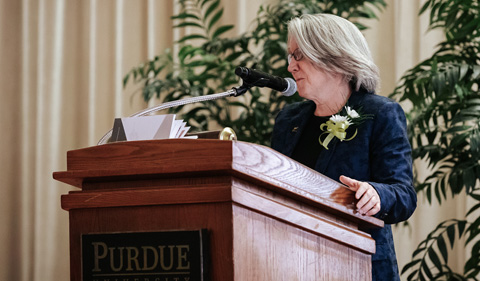The Purdue University College of Agriculture honored Dr. Sarah Wyatt with its 2019 Distinguished Agriculture Alumni Award.
Wyatt earned a Ph.D. in 1995 from Purdue’s College of Agriculture.
Wyatt is Professor of Environmental & Plant Biology and and Director of Molecular & Cellular Biology at Ohio University.
“Sarah’s research is a superb example of the value of persistence in a difficult, yet highly significant, pioneering, experimental discipline. She has a rich portfolio of accomplishments in advancing opportunities for women in STEM education and professional advancement,” said Christopher Staiger, Distinguished Professor and Head of the Department of Botany and Plant Pathology at Purdue.
Purdue wrote the following about Wyatt in the March publication about its 2019 alumni honorees:
Sarah Wyatt is a plant molecular biologist and international authority on gravitational signaling in plants. Her research, including an experiment on board the International Space Station in 2014-15, has provided novel insights about the genes involved in graviperception and will likely impact plant responses to microgravity in the human quest to colonize space. Wyatt directs the interdisciplinary Molecular and Cell Biology program at Ohio University.
Gravity is a fundamental stimulus governing plant growth and development. When plants are reoriented with respect to gravity–placed on their side–the shoots normally bend up and the roots bend down. Wyatt’s research revealed that shoots turned on their side in the cold do not bend but “remember” the gravity stimulus and bend to the side when returned upright at normal temperature. She used this to discover three classes of gravity persistent signal (GPS) mutants and established that the response in all three was related to inappropriate transport of the main growth hormone. Wyatt’s group continues to explore the GPS response by using genomic and proteomic analysis for global gene discovery.
In addition to her research, Wyatt has been involved in teaching and service on local to global scales. At Ohio University, she developed the Tech Savvy OHIO training program through her involvement in the American Association of University Women.
Her national and international service includes ongoing participation in NASA GeneLab’s Plant Analysis Working Group and Plant Science Definition Team. She serves on NASA’s grants panels on International Life Science Research, Spaceflight, and Fundamental Space Biology. Through her involvement in NASA, she also worked with the European Space Agency, International Space Life Sciences Working Group in Washington, D.C., and Belgium.
Wyatt serves on the editorial board of the American Journal of Botany and Gravitational and Space Botany and is active in governance of the American Society of Gravitational and Space Biology and the American Society of Plant Biologists.





















Comments